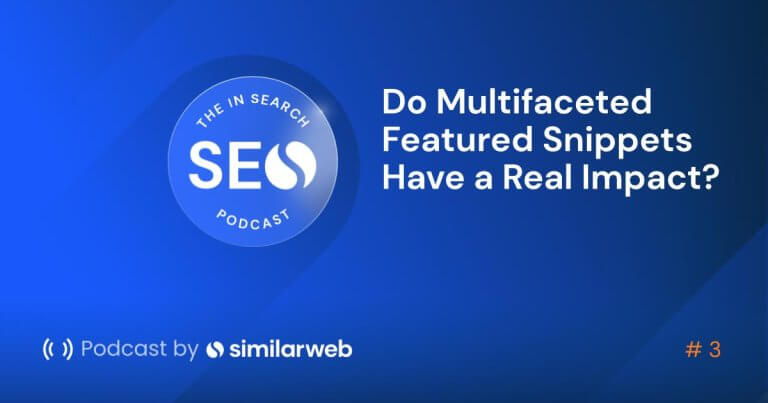 Marketing Intelligence
Marketing Intelligence
In Search Podcast: Do Multifaceted Featured Snippets Have a Real Impact?

In episode 03 of the In Search SEO podcast our hosts, Mordy Oberstein and Jacqueline Harkham dive into:
- New Discover More Places data
- How impactful are Multifaceted Featured Snippets… really?
- Are SEOs too focused on RankBrain?
- What’s new in the world of voice search and what is the SEO industry still glossing over?
Discover More Places Carousels are Far More Common Now
Since October 23rd, our SERP Feature Tracker has identified a large increase in the percentage of page one SERPs that contain the Discover More Places carousel. In the US (desktop) we’ve tracked a 125% increase in the feature’s SERP presence, as the carousel now appears on roughly 7.5% of page one SERPs (up from about 3.5%).
The increase in the Discover More Places carousel has taken place both on desktop and mobile. However, only English speaking markets (UK, Canada, Australia, etc.) have seen a significant and stable increase in the SERP feature.
What’s even more interesting is that there has not been an increase in Local Packs on the SERP. That is, you might suspect the increase in the Discover More Places carousel to be the result of Google showing more Local Packs. This is not the case. Rather, pre-existing Local Packs now show with the Discover More Places carousel tacked onto the SERP.
This means, that if a user is not satisfied with what they see in the Local Pack, they can take a quick trip down the SERP to see what other entities or types of entities are out there. Take the query sushi nyc, with the Discover More Places carousel, not only can the user find additional sushi eateries, but other categories of restaurants altogether (i.e., romantic restaurants, cozy restaurants, etc.).
What Google Means When They Say SEOs Are Too Focused on RankBrain
Google’s John Mueller recently said that SEOs are a bit too focused on RankBrain. The statement was in response to a Twitter question as to whether or not RankBrain considers a site’s UX. Let’s look at Google’s response here and see if we can’t make a little sense out of this exchange as it resulted in a bit of controversy. Did Google really mean we shouldn’t look at RankBrain? Do we actually value it too much?
Let’s think about what Google could have said in order to have avoided any drama. Instead of saying that SEOs are too focused on RankBrain, all Google had to say was, “RankBrain is just one factor, don’t get too hung up on it by thinking solely about RankBrain.” That would have been clear, simple, and would not have resulted in a whole news story about the comment.
Instead, Google said, “We use machine learning in so many places…”. In other words, Google isn’t really saying ” SEOs are too focused on RankBrain.” Rather, RankBrain is not the only machine learning property in use.
Google tends to speak cryptically, even when they don’t seem to be. When Google says SEOs are stuck on RankBrain, what they’re saying is, SEOs should look beyond RankBrain as the sole machine learning entity. That is, instead of answering the question asked head on, Google is making a statement that reflects but one sliver of the question asked, that of RankBrain as the major source of Google’s machine learning progress. In John’s statement, Google is glossing over whether UX plays a role, and is correcting the notion of RankBrain being the machine learning entity related to search.
Are Multifaceted Featured Snippets a Game Changer?
Google has been increasingly testing multifaceted Featured Snippets on desktop. Until now, sporadic queries brought the Featured Snippet format up, but only on mobile. On the surface, the insertion the multifaceted Featured Snippets on the SERP would seem to be a very big deal. After all, one Featured Snippet can dominate the SERP, but here we have two! What chance does a site within the organic results stand against that?
Mordy, however, does not think that the SEO impact of this snippet format is really that immense. He noted, the second featured snippet shown is an extension of the topic related to the query, i.e., it doesn’t directly relate to the search term itself (unlike the initial snippet), but is the next logical step in the topic’s logical sequencing. If a user clicks on the second snippet, it all but means that the user did not execute an efficient query. Meaning, if the topic shown in the initial snippet is irrelevant to the user, then chances are they really meant to search for something else. In such a case, the organic results on the page would be equally inapplicable. Should the second Featured Snippet be relevant over the first, then the entire SERP (to the exclusion of the second snippet) is irrelevant. All that happened in such a case is that instead of the user having to execute another search to pull up another Featured Snippet, Google placed that second snippet right on the first SERP.
Obviously, there are other scenarios regarding how users would engage with the multifaceted Featured Snippet, but overall Mordy gave the SERP feature an SEO impact of 3/10.
SEO News Analysis
New Google Ads Metrics: Google has added four new metrics to help offer a more precise look at your ad performance. The new metrics focus on ad impressions and considers if an ad is simply the first ad on the page or if it is actually the first thing a user sees on the page altogether.
Google Aims to Solve News Publisher’s Problems: For some time now, news publishers have complained that they are having difficulty finding their sites/articles within Google News. Google now says that they are aware of the issue and are working towards a solution.
This is just the latest issue in a long and tenuous relationship between publishers and the search engine. In fact, “news” related items, be it AMP URLs or fake news on the SERP have traditionally given Google a bit of a problem. Even now, queries such as important news or breaking news gives Google a bit of a hard time (these queries rely heavily on the search term being in the title and as a result often produce less than substantial news articles in the News Box). It’s a bit hard to understand why “the news” has given Google so much difficulty, but it surely has.
Google Adds a Way to ‘Follow’ Brands from the Local Panel: You now have a way to track a business via a “Follow” button within Google Maps and the Local Panel. Following a brand or business keeps you up to date on the establishment’s latest news, events, and so forth.
This seems to be Google trying to get a stronger “social media foothold” for itself, but it’s a bit hard to see the effectiveness in this case. Do users really want to stay up to date on brands that badly? Facebook thought otherwise and demoted brand posts within the News Feed. It would seemingly make more sense to let users follow celebrities, sports figures, etc.
Interestingly, Mordy spotted one such instance of this. When searching for who is ben roethisberger, Mordy found that Google was testing the Follow button within the sports figure’s Knowledge Panel. While this appears to have been a test, as the same panel no longer contains the button, it surely makes more sense than the feature showing within a Local Panel for the corner drug store!
Where We Stand with Voice Search & What Google Needs to Do Going Forward
Recently, Aleyda Solis posted her slides from the SMX Milan conference where she discussed voice search optimization. Aleyda brilliantly showed how Google’s assessment of what users need/want from a voice assistant device has driven the emerging technology coming to the market. Part of this has been the need to show content visually as well as a way to offer a deeper content experience. As a result, Google has released Google Hub and has given its devices more conversational abilities.
According to Mordy, as Google seemingly wants to develop a deeper content experience via its voice assistants, it will need to handle one foundational issue that poses a serious problem to its efforts… the vast difference between oral and written language. That is, there is a wide and basic difference between the language formats, making it quite hard to match a voice query to written content. Mordy speculates that this is the reason why voice search devices do better with simpler queries. There is not going to be much of a difference between how someone verbally asks who was the first person to walk on the moon versus how they would ask the same question in writing. However, when the content becomes more complex the variance between the language mediums grows. Mordy is of the opinion that for Google to take voice search where it wants to (i.e., to more complex voice queries and content, as noted by Aleyda), the gap between the language mediums must be bridged.
The In Search SEO Podcast Fun Send-Off!
This week our fun send-off question was:
If Google had parents who would they be?
Jacqueline took a literal approach saying Google’s parents would certainly be, and are, Sergey Brin and Larry Page. Mordy, being Mordy, took it to a more “peculiar” place saying Google’s parents would surely be physicist Neil DeGrasse Tyson and Seinfeld character George Costanza (since Google is “genius,” but at times a bit zany)!
The #1 keyword research tool
Give it a try or talk to our marketing team — don’t worry, it’s free!






